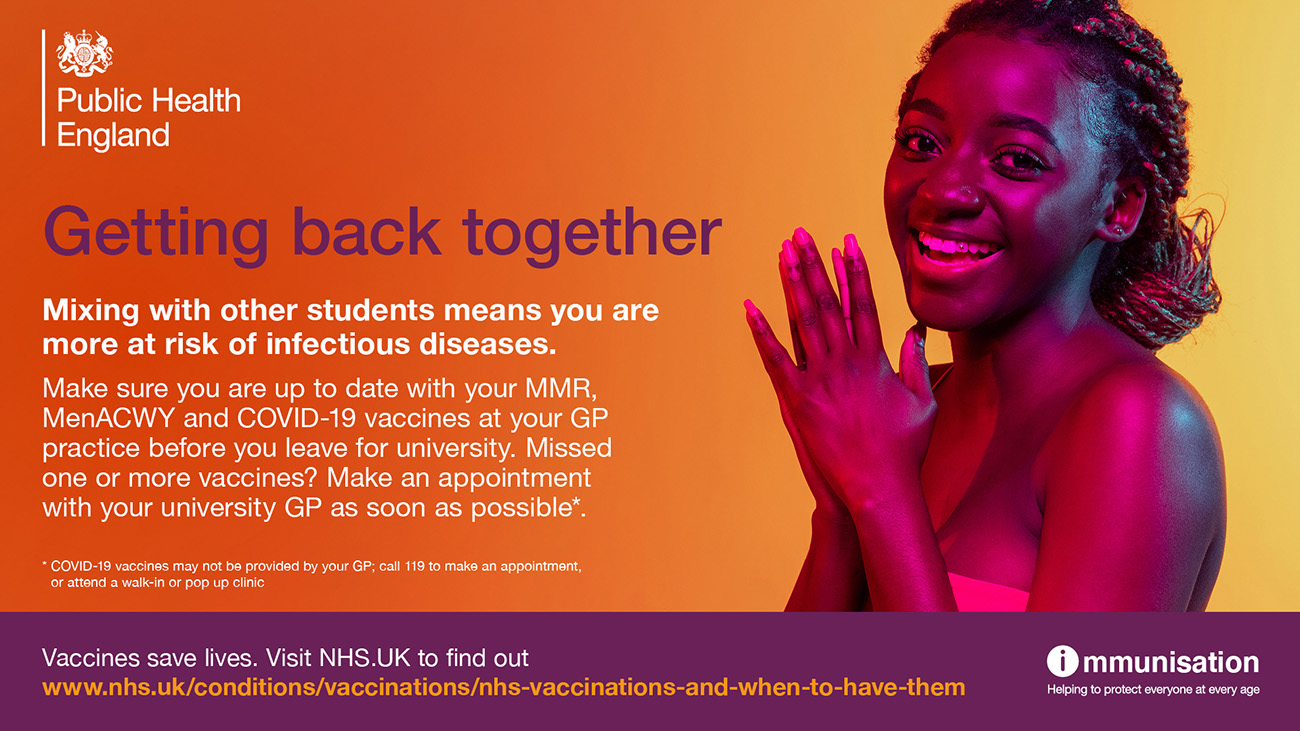Are you and your family up to date with your vaccines?

NHS urges students to make sure they (and their children) are up to date with their free NHS vaccines against meningitis, measles and HPV ahead of starting the new academic year.
With lots of people newly coming together in confined environments and close mixing, universities can be hot spots for COVID-19, flu, measles, mumps and meningococcal disease as they present the perfect opportunity for infection to spread.
Meningitis and septicaemia can both be fatal or cause life-changing disabilities.
In England, all students are offered the MenACWY vaccine in school year 9 or 10, protecting them against 4 different types of meningococcal bacteria that can cause meningitis and septicaemia. The MenACWY vaccine, is available to anyone who missed the vaccine up to their 25th birthday.
Young children are offered two doses of the MMR vaccine, which is the safest and most effective way to protect yourself against measles, mumps and rubella.
It’s important to check you have had both doses of the MMR vaccine as there are measles outbreaks across the country. It is possible for anyone whatever their age to catch up on missed MMR jabs.
All children, aged 12-13 are also offered the HPV vaccine, which protects against certain cancers and genital warts.
If you have not yet had your vaccines, or if you are unsure, you should contact your local GP practice, as soon as possible.
If you're moving away from home, it's important that you register with a new GP surgery. International students who meet the same age criteria are also eligible for these routine vaccines.
Students should be up to date with the following 3 vaccines ahead of starting university:
- MenACWY – protecting against 4 common kinds of meningococcal bacteria causing meningitis and septicaemia
- MMR – protecting against measles, mumps and rubella
- HPV – protecting against human papilloma virus related cancers such as cervical cancer and other cancers of the head, neck and genital areas, and genital warts.
While the MenACWY vaccine offers protection against 4 kinds of meningococcal disease, it does not protect against all forms, like MenB, which is why it’s important to know how to spot the symptoms of Meningitis and septicaemia as early detection and treatment can prove lifesaving.
Symptoms of meningitis and septicaemia may include:
- a high temperature
- cold hands and feet
- vomiting
- confusion
- breathing quickly
- muscle and joint pain
- pale, mottled or blotchy skin (this may be harder to see on brown or black skin)
- spots or a rash (this may be harder to see on brown or black skin)
- headache
- a stiff neck
- a dislike of bright lights
- being very sleepy or difficult to wake
- fits (seizures).
For more information please contact the Corporate Communications Team.


/prod01/wlvacuk/media/departments/digital-content-and-communications/submitted-news-images/Smelting-knife.png)
/prod01/wlvacuk/media/departments/digital-content-and-communications/images-2024/250630-SciFest-1-group-photo-resized-800x450.png)
/prod01/wlvacuk/media/departments/digital-content-and-communications/images/stock-images/WLV-email-header-banner---City-courtyard---Opportunity-teaser.png)
/prod01/wlvacuk/media/departments/digital-content-and-communications/images-2024/Arthi-Arunasalam-teaser.jpg)
/prod01/wlvacuk/media/departments/digital-content-and-communications/submitted-news-images/post-for-i-robot-(002).PNG)
/prod01/wlvacuk/media/departments/digital-content-and-communications/submitted-news-images/Business-School-800x450.jpg)
/prod01/wlvacuk/media/departments/digital-content-and-communications/submitted-news-images/ENA-800x450.png)